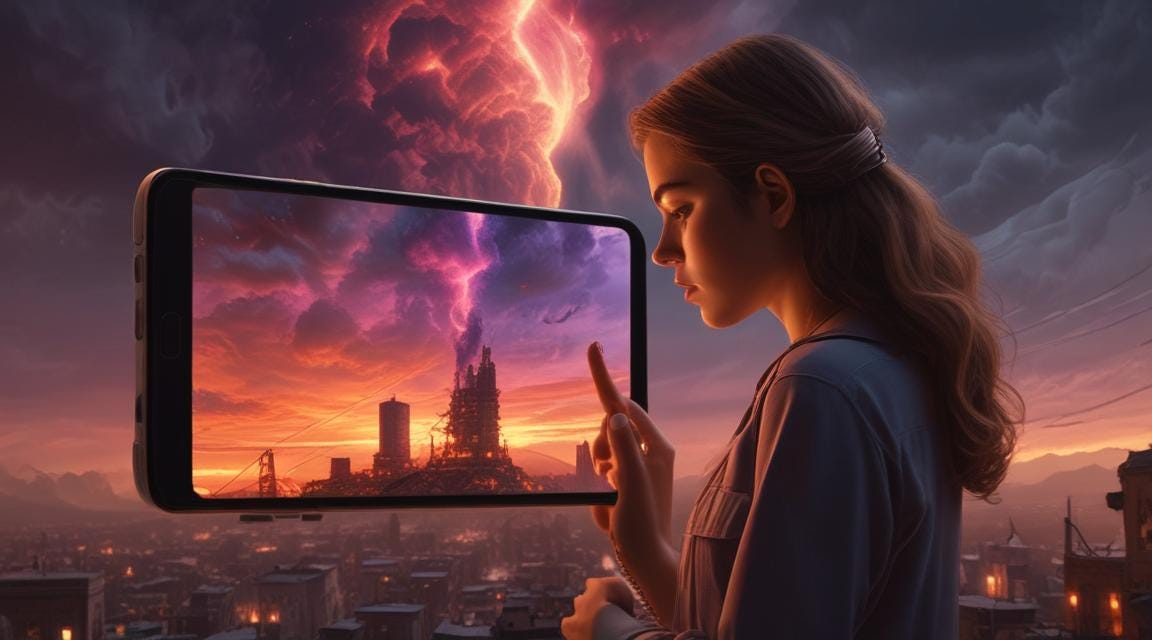Doom, disasters, children, protests, guilt: A science of climate change propaganda
And some exciting news about me
Well, I’ll start with the news about me because I’m excited about it!
I will to be writing regularly as a Senior Fellow for The Breakthrough Institute’s new substack journal.
This is a such a wonderful group of smart, thoughtful writers and analysts who have shaped and continue to shape a pragmatic discourse about the environment, science, and policy. BTI played a significant role in how I think about these issues since reading the Death of Environmentalism in graduate school and keeping up with the works of its community of outspoken scholars.
I am grateful for the opportunity and I’m looking forward to more writing, learning, and engagement with readers with diverse opinions and knowledge.
The first post announcing the journal’s launch sets the stage for future contributions. Ted Nordhaus, Alex Trembath, and Alex Smith provide a sharp summary of where we are today in US politics and the vulnerability of our democratic institutions to a torrent of crazy:
Crazy feeds on crazy. The increasing detachment of American politics both from real social, political, economic, and technological constraints and from actual popular sentiment is driven by crazy. And crazy is asymmetrical in what it serves. The bar for those wishing to defend functioning institutions, effective governance, and wise public policy is unavoidably higher than for those intent on undermining them.
The state of climate change politics and its various dysfunctional and opportunistic conflations is only a manifestation of far deeper issues, the crazy.
I will keep my Conflicted substack. It needs some TLC and with the academic year wrapping up I hope to tend to it. In the future, expect short write-ups here and more in depth discussions at the BTI journal.
Cray cray
Earlier this year a paper in Science Advances provided results on a “megastudy” of behavioral outcomes of different messaging on climate change. The lead author is a collaborator on a larger project aimed to “advances knowledge regarding the climate crisis denial and inaction around the world.”
The megastudy looked to understand how different messaging interventions influenced four target outcomes:
Belief
we examined how the interventions would affect these outcomes for different people along the belief continuum ranging from skeptics to true believers.
Policy
support for climate mitigation policy…this outcome variable reflects the importance of impactful systemic change, rather than private mitigation efforts based on individual decision-making.
Share
To target more ecologically valid behavior and climate activism, the third outcome was willingness to share climate mitigation information on social media.
Action
effortful behavior of contributing to a real tree planting initiative by engaging in a cognitively demanding task (i.e., a modified version of the work for environmental protection task or WEPT). The WEPT is a multirial, web-based procedure in which participants choose to exert voluntary effort screening stimuli for specific numerical combinations (i.e., an even first digit and odd second digit) in exchange for donations to a tree-planting environmental organization.
The study exposed participants to the following “definition of climate change”:
Climate change is the phenomenon describing the fact that the world’s average temperature has been increasing over the past 150 years and will likely be increasing more in the future.
If they were in the experiment group then they were exposed to one of 11 experimental interventions shown in the figure above (figure 1 in the paper.)
Then, participants were directed to rate their (i) climate beliefs, (ii) climate policy support, and (iii) willingness to share climate information on social media. Last, participants were given the chance to contribute to tree-planting efforts by completing the WEPT.
Well, we might ruffle at the definition of climate change used in the study- it’s not in fact the widely recognized definition of climate change and then that in turn belief in the fabricated definition should then be characterized as a continuum of skeptic to true believer.
The graph below shows the research results. It takes a minute to make sense. I will point out some things I found interesting.
It turns out that none of their communication intervention had much positive impact on action (ie. planting a tree). Quite the opposite actually.
The greatest impact- the intervention leading to the greatest reduced inclination to action, was doom and gloom messaging (ie. negative emotions, pink) and messaging linking climate change to disasters (i.e. psychological distance, orange).
This is not surprising. Many have noted that doom messaging is stymieing for practical action. But it happens to be very good for getting people to share things on social media.
All interventions increased the intention to share messages on social media with doom and gloom messaging producing the largest gains followed by invoking children (ie. letter to future generation, light blue).
The greatest support for climate mitigation policy is found by invoking children, protests (i.e. collective action, green), or guilt1 (ie. future self continuity, grey).
Together the findings indicate that climate change messaging with doom, disasters, children, protests, and guilt can drum up a lot of shares while not getting a whole lot done. Moreover, one can amass blind support- at least online support- for seemingly any idea once they prime the viewer with some guilt2.
And so, these symbols and affects feature prominently in online advocacy propaganda usually calling for action that is impracticable.
Finally, it is worth noting that the lead author secured funding for the project through Google Jigsaw.
Jigsaw aims to explore threats to open societies in part by “helping a specific group of people- journalists, civil society, or activists, for example.” It focuses on three main areas: Disinformation, Toxicity, Censorship, and Violent extremism.
I paraphrase after review of Hershfield et al (2012) from which the intervention is derived
The climate change definition used by the researchers was not accurate and participants received one of 9 policy options such as: “I support raising carbon taxes on gas/fossil fuels/coal.” (A little? a lot? where does the money go?)








Congrats, Jessica!